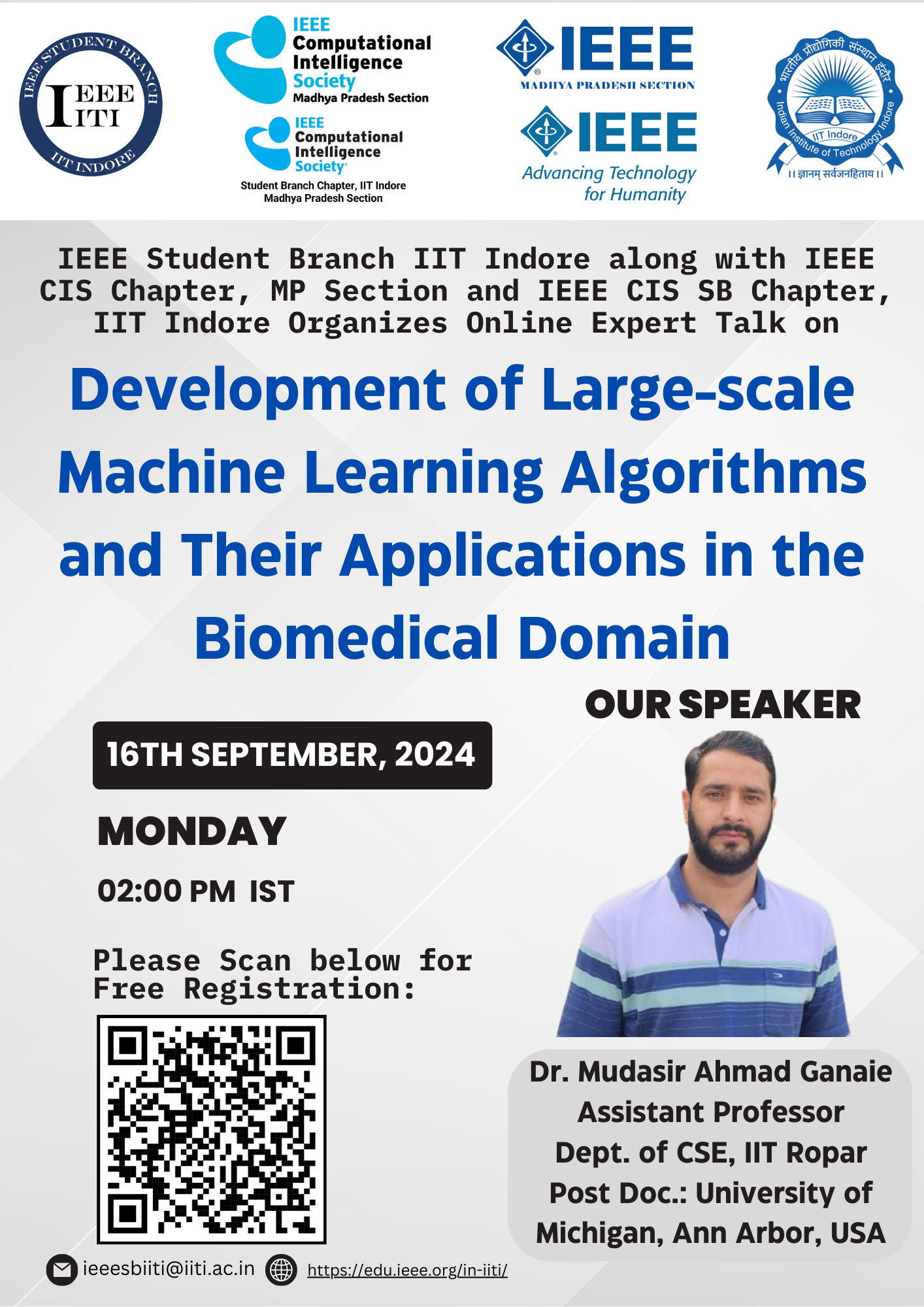Development of Large-scale Machine Learning Algorithms and Their Applications in the Biomedical Domain - IEEE SB IIT Indore
IEEE Expert Talk on the Development of Large-scale Machine Learning Algorithms and Their Applications in the Biomedical Domain
The IEEE Student Branch IIT Indore, in cooperation with the IEEE CIS Chapter, MP Section and IEEE CIS SB Chapter, IIT Indore, is pleased to invite you to an Online Expert Talk on the Development of Large-scale Machine Learning Algorithms and Their Applications in the Biomedical Domain. The talk will be delivered by Dr. Mudasir Ahmad Ganaie, Assistant Professor in the Department of Computer Science and Engineering at IIT Ropar.
Details of the event are as follows:
Date: 16th Sept., 2024 (Monday)
Time: 02:00 PM IST
Venue: Online (Link will be shared prior to the event to the registered candidates)
Registration: The registration for this event is free but mandatory to attend. Please register through the following link: https://forms.gle/
Date and Time
Location
Hosts
Registration
Speakers
Dr. Mudasir Ahmad Ganaie of Indian Institute of Technology Ropar
Development of Large-scale Machine Learning Algorithms and Their Applications in the Biomedical Domain
In this talk, Dr. Mudasir Ahmad Ganaie will present a novel large-scale machine learning algorithm. Twin support vector machines (TSVMs) have been widely used for binary classification problems, but they face challenges in handling large-scale datasets due to the need for computing large matrix inverses and overfitting issues arising from empirical risk minimization. To address these limitations, a novel fuzzy least squares TSVM for class imbalance learning (LS-FLSTSVM-CIL) is proposed. The LS-FLSTSVM-CIL addresses these challenges by eliminating matrix inversions and incorporating structural risk minimization to avoid overfitting. Additionally, fuzzy weights are employed to effectively handle class imbalance, ensuring a more balanced classification. The model is optimized using a sequential minimization approach, making it computationally feasible for large-scale problems. Moreover, the speaker will also demonstrate the practical applications of this algorithm in the biomedical domain, including the diagnosis of Alzheimer’s disease and breast cancer.
Biography:
Dr. Mudasir Ahmad Ganaie is currently working as an Assistant Professor, in the Department of Computer Science and Engineering, Indian Institute of Technology Ropar. Prior to that, he worked as a postdoctoral research fellow at the University of Michigan, USA. He is an active researcher in the field of Machine Learning (ML). He has been working on the mathematical modeling of ML for the problems of classification and regression. Particularly, he has been working on the problem of noise in the data, class imbalance learning and reducing the computational cost of the ML models. He has published over 28 reputed Journals with an average impact factor of 7.88, the highest impact factor of 19.118 and a total impact factor of 220.529. Journal publications include IEEE Transactions on Fuzzy Systems (I.F.=12.253), IEEE Transactions on Cybernetics (I.F.=19.118), IEEE Transactions on Neural Networks and Learning Systems (I.F.=10.4), IEEE Transactions on Computational Social Systems (I.F.=4.747), IEEE Journal of Biomedical and Health Informatics (I.F.=7.021) and IEEE Transactions on Computational Biology and Bioinformatics (I.F.=3.702). Moreover, he also published in reputed journals of Springer and Elsevier including Machine Learning (I.F.=5.414), Annals of Operations Research (I.F.=5.414), Knowledge Based Systems (I.F.=8.139) and Information Fusion (I.F.=17.564). He has received more than 2400 citations with an h-index of 21 and an i10-index of 31 (Sept., 2024 on Google Scholar). In addition, he has published over 7 conference papers of international repute. The codes of most of the publications are publicly available on the GitHub repositories (https://github.com/ganaiemudasir05 and https://github.com/mtanveer1). He received the BEST PAPER AWARD for the IIT Indore and ICONIP conference. Currently, he is guiding two PhD research scholars and one masters student for their thesis. He is actively volunteering for the research community as an Associate Editor of Computers and Electrical Engineering, Elsevier (I.F.=4.152) and Action Editor of Neural Networks, Elsevier (I.F.=9.657). He acted as the local chair of the Indian Conference on Computer Vision, Graphics and Image Processing (ICVGIP) 2023, technical Program Committee member of ICCAE 2024-the 16th International Conference on Computer and Automation Engineering in Melbourne, Australia and National organizing committee member of IEEE Computational Intelligence Society (CIS) Summer School 2022.
Email:
Address:Assistant Professor, Department of Computer Science and Engineering, Indian Institute of Technology Ropar, Ropar, India, 140001
Agenda
In this talk, the speaker will present a novel large-scale machine learning algorithm. Twin support vector machines (TSVMs) have been widely used for binary classification problems, but they face challenges in handling large-scale datasets due to the need for computing large matrix inverses and overfitting issues arising from empirical risk minimization. To address these limitations, a novel fuzzy least squares TSVM for class imbalance learning (LS-FLSTSVM-CIL) is proposed. The LS-FLSTSVM-CIL addresses these challenges by eliminating matrix inversions and incorporating structural risk minimization to avoid overfitting. Additionally, fuzzy weights are employed to effectively handle class imbalance, ensuring a more balanced classification. The model is optimized using a sequential minimization approach, making it computationally feasible for large-scale problems. Moreover, the speaker will also demonstrate the practical applications of this algorithm in the biomedical domain, including the diagnosis of Alzheimer’s disease and breast cancer.
Organizer: IEEE Student Branch IIT Indore
Sub-organizers: IEEE CIS Chapter, MP Section and IEEE CIS SB Chapter, IIT Indore
Contact us: +91-787009378 (Md Sajid: Vice Chair, IEEE Student Branch IIT Indore)
Email: ieeesbiiti@iiti.ac.in



 Add Event to Calendar
Add Event to Calendar